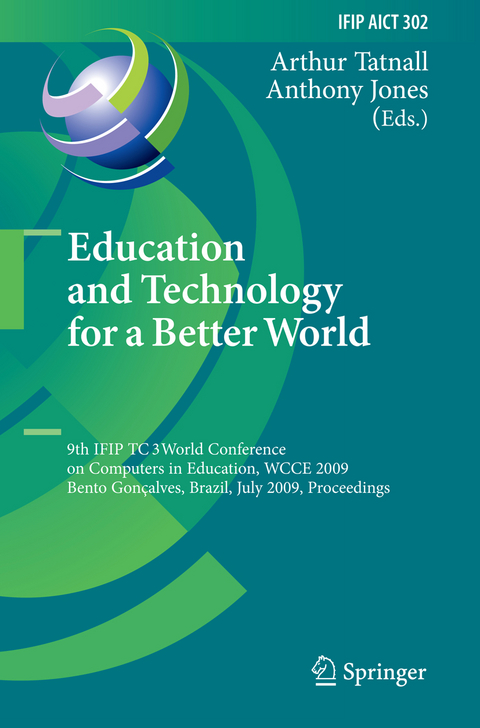
Education and Technology for a Better World
Springer Berlin (Verlag)
978-3-642-24230-4 (ISBN)
Invited Papers from Brazil.- Scientific and Technological Education in Brazil: Advancements and Challenges for the 21st Century.- NASA Education and Educational Technologies Exemplified by the Space Weather Action Center Program.- Evaluation of Distance Course Effectiveness - Exploring the Quality of Interactive Processes.- Innovation and Creativity in Schools.- The Impact of the Multi-sensory Program Alfabeto on the Development of Literacy Skills of Third Stage Pre-school Children.- Personalized e-Learning Environments: Considering Students' Contexts.- Software Junctus: Joining Sign Language and Alphabetical Writing.- Innovative Teaching/Learning with Geotechnologies in Secondary Education.- A New Virtual and Remote Experimental Environment for Teaching and Learning Science.- Investment in Information and Communication Technologies in the Irish Education Sector.- Pyramids in Logo: A School Project in 'Search' of the Fourth Dimension.- Towards Transformation: AlwaysOn Students and Health Education.- Virtual Cities as a Collaborative Educational Environment.- ICT Action School Development at Helen Parkhurst Dalton School, Part II.- E-Maturity and School Development: When the Tail Wants to Wag the Dog.- Toward a Learning/Instruction Process Model for Facilitating the Instructional Design Cycle.- The Making of an Online Masters Program in the North American Context.- Informatics.- CV-Muzar Using a Multiagent System for Group Formation.- The Development of Educational Games Supported by a Pedagogical Tutor Agent.- Applying Informatics Knowledge to Create 3D Worlds.- Digital Solidarity.- Ensuring Success and Quality through the Use of Standards in Team Projects: Students' Perceptions.- Implementing and Sustaining Educational Change and ICT: A Case Study of a Taiwanese Primary School.- The Mexican National Programs on Teaching Mathematics and Science with Technology: The Legacy of a Decade of Experiences of Transformation of School Practices and Interactions.- Trust and Conflicts in Distance Learning Higher Education Courses Tutor Teams.- Learners and Life Long Learning.- Bridging the Digital Divide, Aiming to Become Lifelong Learners.- Evolution of Information Systems Curriculum in an Australian University over the Last Twenty-Five Years.- Secondary School Students' English Writing Aided by Spelling and Grammar Checkers.- Learning Design for Creating a Lifelong Learning Organization.- Open Virtual Worlds as Pedagogical Research Tools: Learning from the Schome Park Programme.- Technology Mentoring: Research Results across Seven Campuses.- So I Sat Down with My Mother: Connectedness Orientation and Pupils' Independence.- Preparing Graduate Students for Industry and Life Long Learning: A Project Based Approach.- Advanced Networks in Dental Rich Online MEDiA (ANDROMEDA).- A Competency-Based Learning Resource Retrieval Process: The LUISA-UHP Case-Study.- Networking and Collaboration.- Is There a Role for Social Networking Sites in Education?.- Collective Text Editor: A New Interface Focused on Interaction Design.- An Open-Source Learning Content Management and Assessment System.- Supporting Collaborative Learning Activities with a Digital Library and Annotations.- Using Cultural Historical Activity Theory (CHAT) to Frame 'SuperclubsPLUS', an Online Social Network for Children.- Using Text-Mining to Support the Evaluation of Texts Produced Collaboratively.- PLME as a Cognitive Tool for Knowledge Achievement and Informal Learning.- Growing a Peer Review Culture among Graduate Students.- Teaching and the Role of Teachers.- Computers in the Teaching of English as a Foreign Language: Access to the Diversity of Textual Genres and Language Skills.- A Study on Pedagogical Requirements for Multi-platform Learning Objects.- Podcasts in Higher Education: Students' and Lecturers' Perspectives.- Design Patterns for the Use of Technology in Introductory Mathematics Tutorials.- Learning by Peers: An Alternative Learning Model for Digital Inclusion ofElderly People.- Teachers' Perceptions about the Barriers and Catalysts for Effective Practices with ICT in Primary Schools.- Transformative Personal Development: Helping Teachers to Thrive on Discontinuous Change.
| Erscheint lt. Verlag | 1.12.2011 |
|---|---|
| Reihe/Serie | IFIP Advances in Information and Communication Technology |
| Zusatzinfo | XIII, 466 p. |
| Verlagsort | Berlin |
| Sprache | englisch |
| Maße | 155 x 235 mm |
| Gewicht | 719 g |
| Themenwelt | Schulbuch / Wörterbuch ► Unterrichtsvorbereitung ► Unterrichts-Handreichungen |
| Mathematik / Informatik ► Informatik ► Datenbanken | |
| Mathematik / Informatik ► Informatik ► Grafik / Design | |
| Mathematik / Informatik ► Informatik ► Netzwerke | |
| Informatik ► Software Entwicklung ► User Interfaces (HCI) | |
| Informatik ► Theorie / Studium ► Künstliche Intelligenz / Robotik | |
| Sozialwissenschaften ► Pädagogik | |
| Schlagworte | algorithms • Blended Learning • business computing • Chat • Collaborative Learning • computer assisted learning • computer use • course management • Digital Libraries • Distance Learning • Educational Games • Educational Technologies • E-Learning • Games • GIS • higher educat • higher education • ICT • Instructional Design • Knowledge Representation • Language Study • learning models • Learning Object • Lifelong Learning • Modeling • Multi-agent Systems • Multimedia • Object Interoperability • Ontologies • Pedagogy • personalization • Quality in education • school mathematics • semantic web • SOA • Social Networking • Social Networks • Teacher Education • Teaching methods • Text Mining • virtual learning |
| ISBN-10 | 3-642-24230-8 / 3642242308 |
| ISBN-13 | 978-3-642-24230-4 / 9783642242304 |
| Zustand | Neuware |
| Haben Sie eine Frage zum Produkt? |
aus dem Bereich


